The issuefication of a place: The issue dynamics of a melting Arctic
(The slides from the presentation of the project on the final day of the sprint can be found here.) Issue expert: Matthew McKinnon EMAPS project facilitator: Erik Borra Team members: Federica Bardelli, Liliana Bounegru, Gabriele Colombo, Natalia Sanchez, Sophie WaterlooIntroduction and research questions
When combined with economic and political developments, the changing Arctic is the most significant physical global event since the end of the last Ice Age. ( Hoover Foundation)
A warming Arctic is becoming a matter of concern, activating a diversity of fundamental issues such as environment and climate change, economics, resources and development, political, sovereignty and security issues, as well as native communities, and mobilising a multitude of actors in competition with each other for energy resources, trade routes and territorial claims. Governance structures (the Arctic Council), conferences (The Arctic Challenge) and alliances are created around this region and prospects of tensions and conflicts around the opportunities that the heating of the Arctic is opening up in the region are emerging. At the end of last year a Deutsche Welle headline asked: " A new Cold War in the Arctic?" This project took up this increasingly heated topic and asked:- How is the Arctic being issuefied?
- What are the concerns and the issues that a melting Arctic activates?
- Which types of actors are bearing the issue and how?
Datasets
1. Mainstream media (Lexis Nexis) 2. National and European policy spaces 3. The global security think tanks space 4. The international climate change NGOs space 5. The climate change space on Twitter 6. The international climate change negotiations spaceAnalyses and findings
1. Mapping the resonance of issues related to the Arctic in the mainstream media from 1980 until today
Description of the data
The term Arctic is queried in Lexis Nexis, a database for mainstream media. The queries are set between 1980-2014, capturing articles every 5 years. Lexis Nexis provides a classification of the articles based on the type of publication, the subject (e.g. Oil and Gas or national security), the industry (e.g. Military Weapons or Tourism) as well as the names of companies, people and geographical locations that are mentioned in the articles. The system provides along with the category the number of mentions in the following format Oil and Gas (53).
This data is captured for each period of 5 years with the objective to visualize how the Arctic is issuefied: what type of issue is the Arctic in mainstream media? And how has this changed over the time? By issuefication is meant to trace how, in this case, a place has becomes a topic of interest (newsworthy) and what sub-issues are associated with it and how have this attention cycles, what actors are concern with it and how can these actors can be organized in larger groups based on their shared interests. Of special interest here is to explore the topic of the militarization as well as of the extraction of oil and gas in the Arctic. Is the Arctic moving away from an environmental concern and increasingly becoming a security topic in the media?
Methods
The data is organized in spreadsheets (one for each period of 5 years). In the spreadsheet a column dedicated to each of categories. Then each category is visualized separately over time (e.g. how many articles are categorized as addressing the arctic as an Oil and Gas issue from 1980-1985, 1985-1990 and so forth).
-
The evolution of the top subjects (those with the largest number of mentions) associated with the Arctic is visualized as a flow chart. It becomes possible to see what subjects have remain relevant throughout the years and which have declined or disappeared from the top.
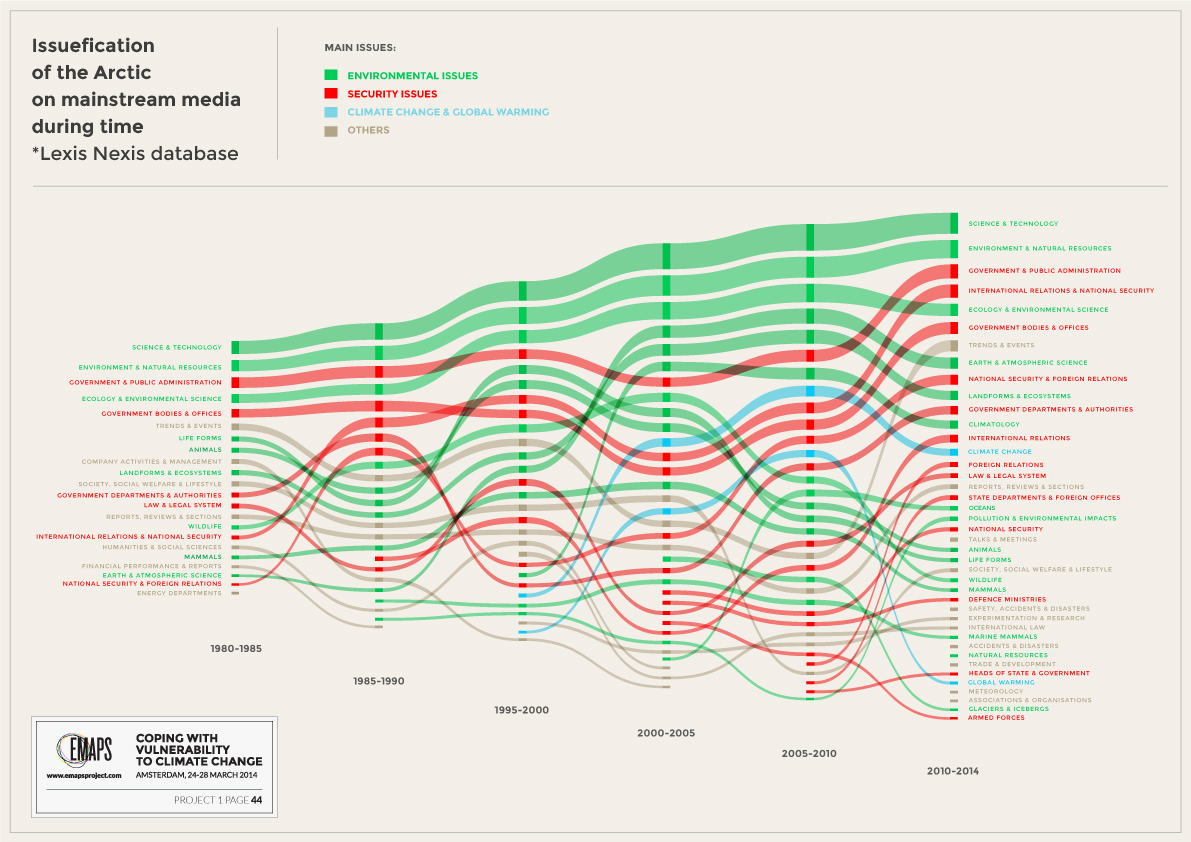
-
Industry data is visualized as flow chart.
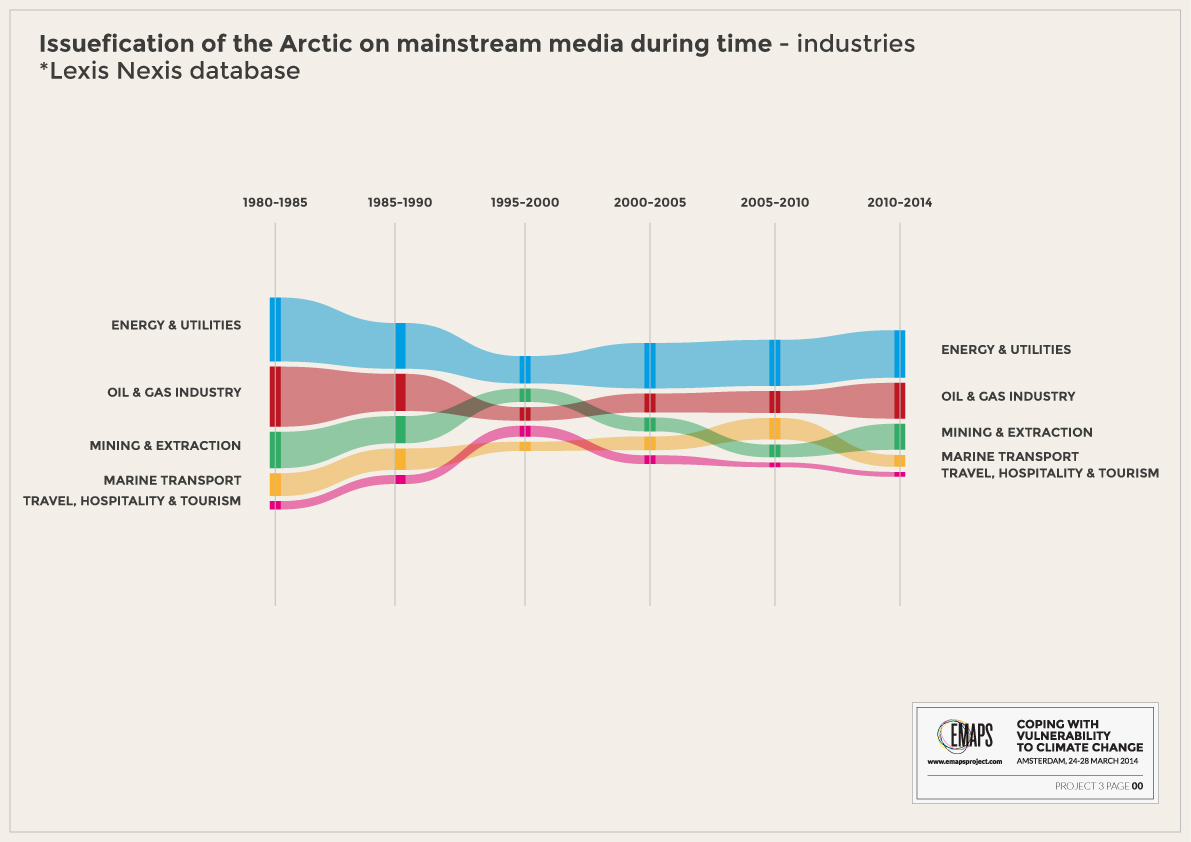
-
Companies mentioned in the articles are visualized as a network, where the articles are sources and the names of the companies referenced are targets, the edge is articles that mentioned companies. This allows seeing which companies are often mentioned together in the media and through a close reading of the content of the articles is possible to describe in which terms are they mention together (e.g. scandals such as oil spills or attempts on exploration). A tag-cloud is made using the text from the articles gathered.
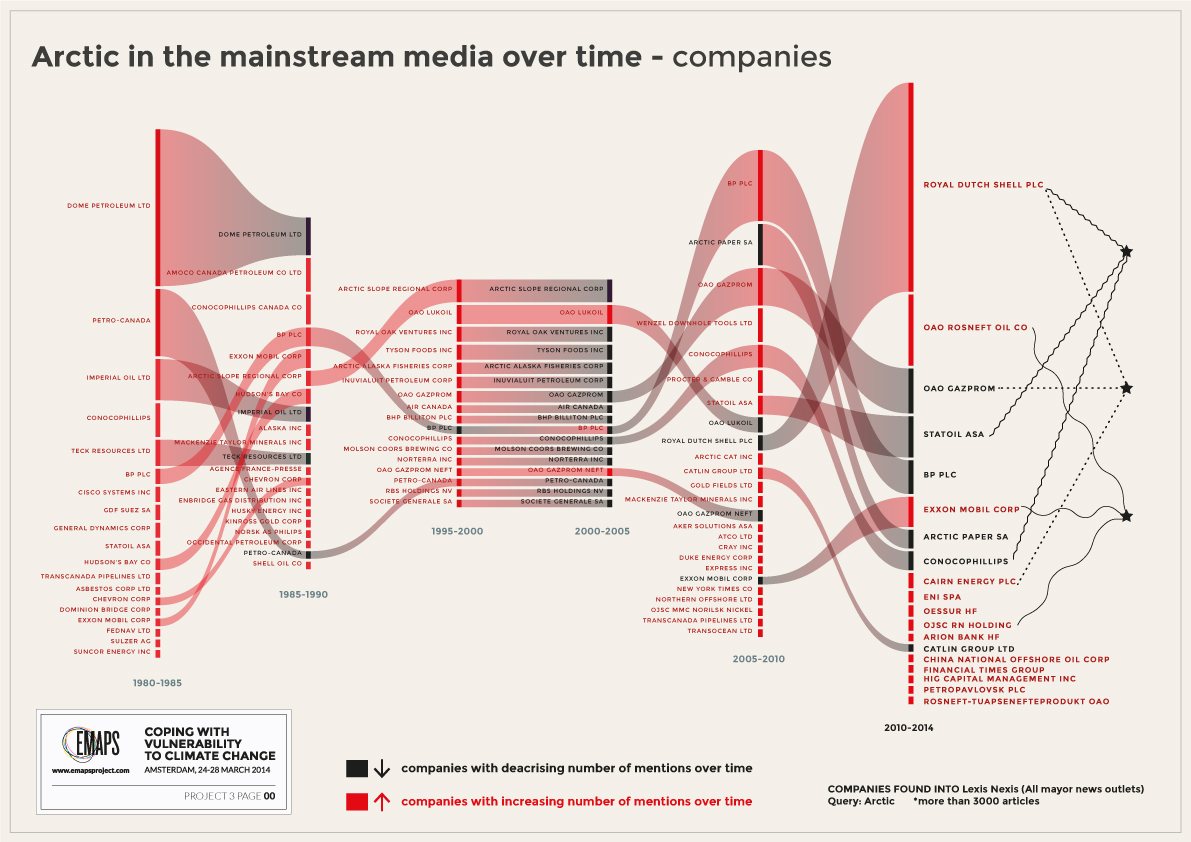
Findings
-
The Arctic is increasingly framed in mainstream media as a an issue of National Security, Government and Public Administration, International Relations and Defense Ministry, especially in the past 10 years. At the same time the popularity of topics related to Wildlife, Mammals, Icebergs and Glaciers ecology that until the late 1990s had constant raise are now in decline. This illustrates a change in which the Arctic is being issuefied and what is newsworthy about it. Subjects such as Foreign relations, heads of state and government have only gained popularity in the last five years.
-
The association of the Arctic with industries
-
Companies that are new to the media space are Icelandic OESSUR, MMC Norilsk Nickel Russian nickel and palladium mining and smeltingcompany, China National OffShore, CAIRN Energy, form the UK. When analyzing in what companies and in which context they are metioned together by the media
2. Mapping the resonance of the Arctic in relevant policy spaces in the countries that have borders on the Arctic (environment, foreign affairs, energy and security)
In order to map how the Arctic is becoming an issue in national and European policy spaces we collected the ministries that have a stake in the Arctic of the countries that have borders on the Arctic. These ministries are: Defense, Environment, Energy, Foreign Affairs and Maritime Affairs or Transport. For the EU space, the equivalent DGs (Directorate Generals) of the European Commission were collected (with the exception of Defense). The websites of these ministries were queried for the issue Arctic with the Lippmanian device (settings: no of results per query: 1000, uncheck only query discrete sites). The results were visualised in order to answer the question: How is the Arctic becoming an issue in the policy arena of countries that border it?
Findings
The first visualisation shows the resonance of the Arctic in each type of ministry of the countries that border it and the EU, cumulatively. The most striking finding is that the Arctic is declining as an environmental issue in these countries. Foreign affairs, followed by defense and maritime affairs are taking over as most resonant formats for the Arctic issue in the countries that border it and the EU.
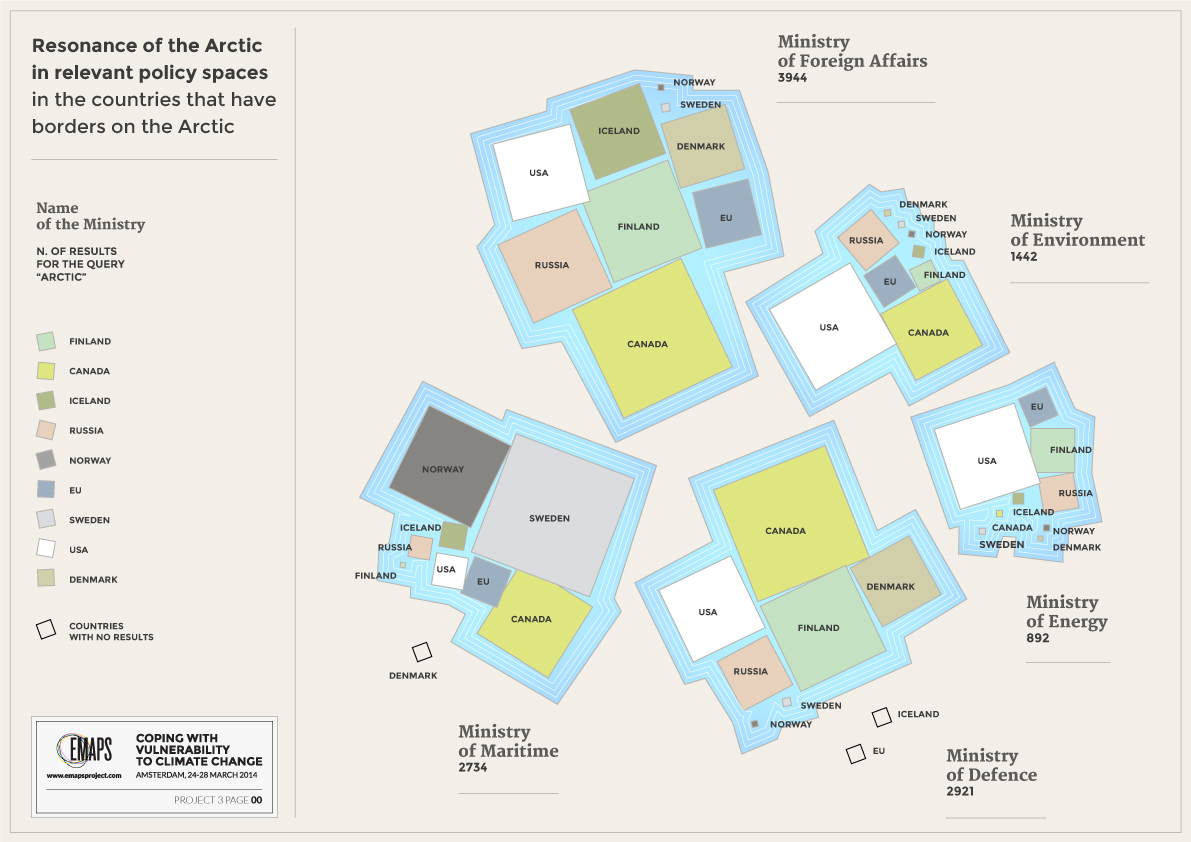
The second visualisation shows the formatting of the Arctic into issues per country. The most striking aspect in this visualisation is the absence of the Arctic from several policy areas in several of the countries: defense, energy, environment, maritime in four of the nine countries that border the Arctic (so we will have to double-check the results of the queries in this case).
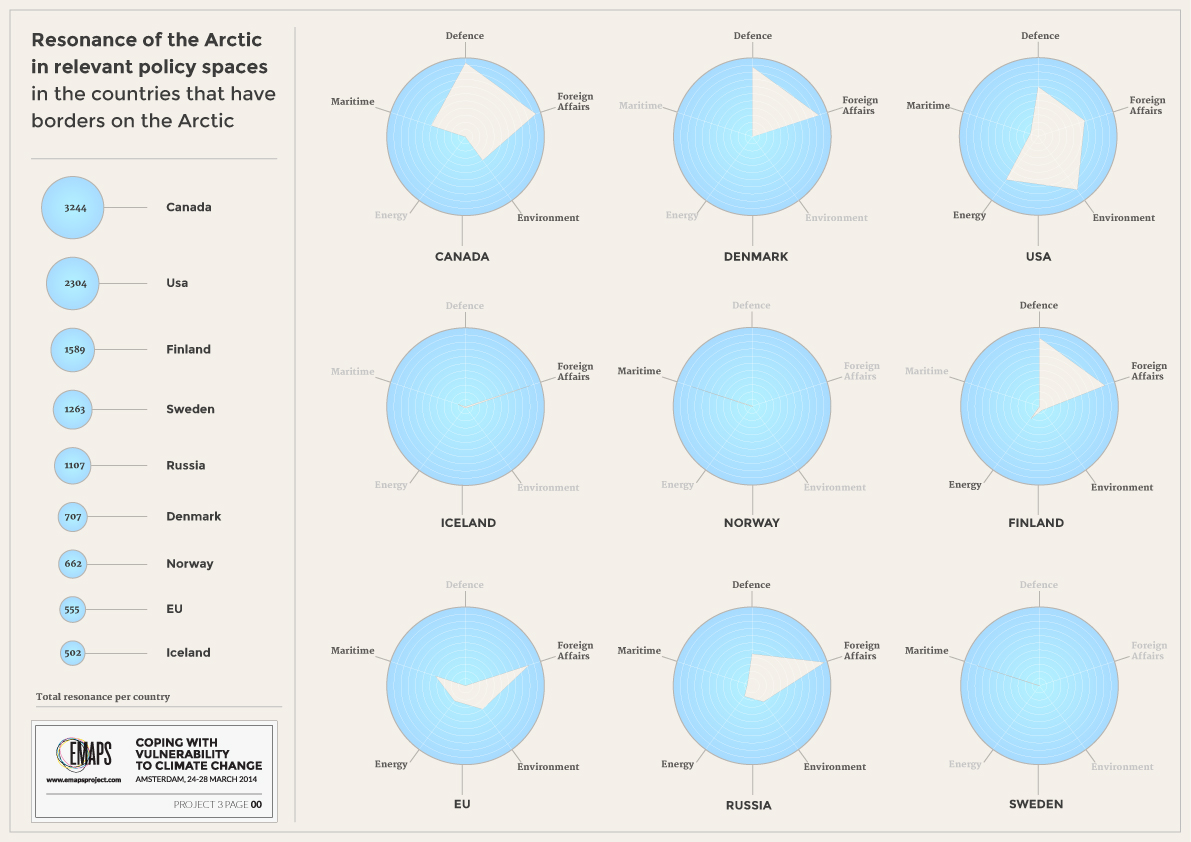
3. Mapping the resonance of the Arctic in the global security think tanks space and the international climate change NGOs space
For this analysis we used an expert list of 65 security think tanks around the world and a list of A list of 73 NGO websites. The security think tanks list was compiled in January this year by the Think Tanks and Civil Societies Program of the University of Pennsylvania, an initiative which conducts research on the role policy institutes play in governments and civil societies around the world. The websites of the think tanks were collected, two of which could not be identified. The list of international climate change NGOs was compiled by merging the lists of two umbrella climate change organisations: ClimateNetwork.org and TCKTCKTCK.org.
The resulting two lists of were queried for Arctic and sixteen of its major sub-issues:
Arctic AND military
Arctic AND extinction
Arctic AND oil
Arctic AND gas
Arctic AND transportation
Arctic AND indigenous
Arctic AND tourism
Arctic AND environment
Arctic AND climate
Arctic AND maritime
Arctic AND policy
Arctic AND governance
Arctic AND drilling
Arctic AND ice
Arctic AND melting
Arctic AND species
The sub-issues were identified by discussions with an issue expert and exploratory analysis of media articles and NGOs websites working on this issue.
Findings
Two visualisations resulted from this analysis. The first one is a source tag cloud which shows the resonance of the Arctic in the security think tanks space around the world. The issue, as we could anticipate, resonates most in US based think tanks such as the The Hoover Institution, the Center for American Progress and the Brookings Institution as well as the Stockholm International Peace Research Institute. In what context is the Arctic mentioned in the top websites? In the case of the Hoover Institution, the think tank runs the Arctic Security Initiative which deals with the strategic and security implications of increased activity in the Arctic. The Center for American Progress deals with the Effects of a Melting Arctic on the Global Economy. The Brookings Institution is concerned with the Arctic as policy/ governance issue and connections with oil, gas, energy, trade. The Stockholm International Peace Research Institute is concerned with the situation of indigenous peoples, the role of industry in the Arctic, environmental issues, the question of observer status in the Arctic Council and the role of the Council in the regions security governance.
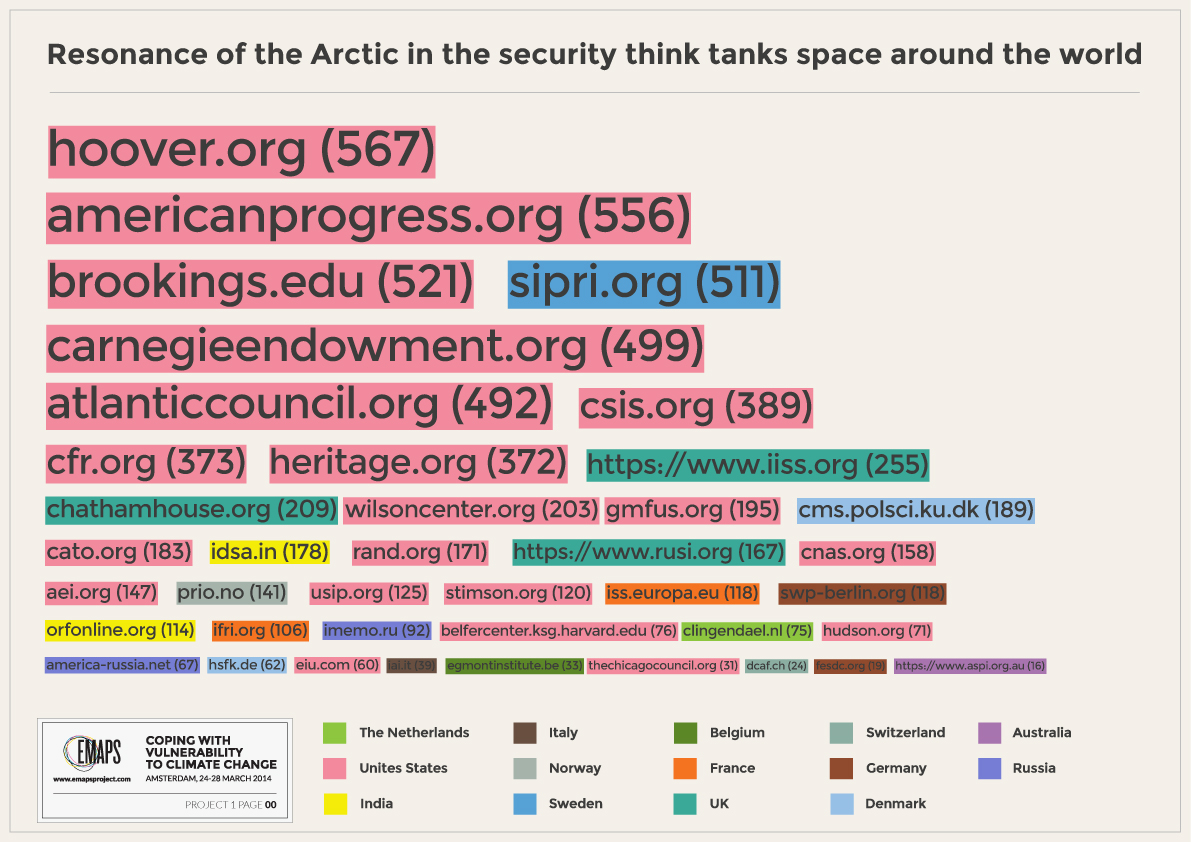
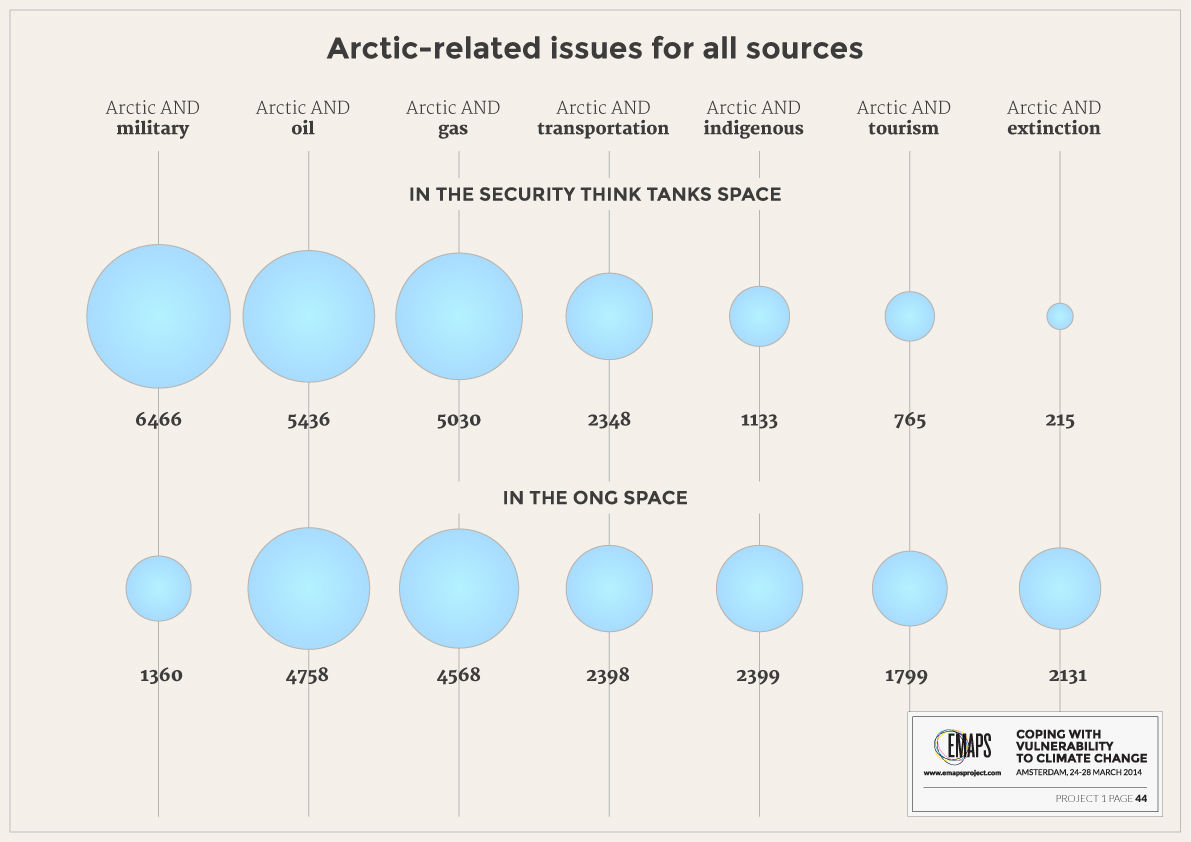
4. Mapping the military formations issue in the climate change Twitter space
Further we zoomed into the most resonant issue in the security think tanks space, the military formations issue, to see if it is present in other relevant space such as the international negotiations space and Twitter.
Mapping the formatting of the Arctic as an issue in the climate change Twitter space
| Dataset: | globalwarming (climate, climatechange, drought, flood, global warming, globalwarming) |
| Search query: | arctic |
| Exclude: | |
| From user: | |
| (Part of) URL: | |
| Startdate: | 2012-11-23 |
| Enddate: | 2014-03-25 |
| Number of tweets: | 211.302 |
| Number of distinct users: | 101.189 |
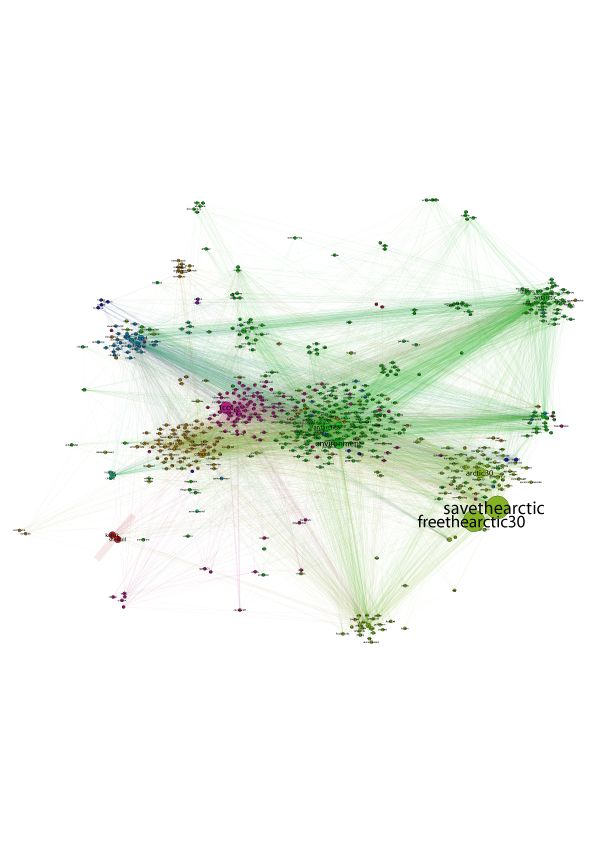
Clusters
1. Bright Pink: tcot, teaparty, copolitics, up4climate, gop, p2b, climateprogress, topptog, rednationrising, unitedblue, ocra, globalwarminghoax, wiunion, tlot, climatecliff, opslam, twisters
>> Political responses to climate change
liberals and conservatives (tcot, teaparty, rednationrising, ocra, tlot, opslam), event attention to climate change, political, fight against liberal lies (opslam)
2. Light Green: savethearctic, freethearctic30, arctic30, greenpeace, polarbearday, cop19, iceclimb, poland, gazprom, petition, humanrights, indigenous, nordic, alaska, shell, oil, ipcc, wef, coal, putin, oilspill
>> Activism cluster: recognition of dangers for northpole, protecting the arctic
Petitions, protests (arctic30), and iceclimb for getting attention for the dangers for northpole, focus on stopping oil companies (shell, gazprom), oilspills and arctic drilling. Dangers for animals (polarbears) and indigenous people.
3. Orange: cdnpoli, ontario, canadian, canada, tarsands, dothemath, topoli, onpoli, uspoli, connectthedots, complexity, arcticcouncil, thermodynamics, icecap, idlenomore, abpoli, bcpoli, vancouver, toronto, nokxl
>> Canadian politics around arctic and controversy KeystoneXL pipeline
canadian politics (cdnpoli, ontario, canadian, canada, vancouver, toronto, topoli, onpoli, bcpoli, abpoli), intergovernmental forum arctic (arcticcouncil), heat/temperature in relation to energy/work (thermodynamics), Keystone XL pipeline (nokxl): The spill-prone pipeline would carry 800,000 barrels a day of toxic tar sands bitumen, from the tar sands fields of Alberta, Canada, across our entire country.
4. Bright Green: environment, science, antarctica, action, sustainability, methane, permafrost, clifi, nature, oceans, wilderness, ocean, co2, carbon, earth, penguins, greenland, atlantic, sealevel, glacier, divest, conservation, wildlife, biodiversity, sea, ice, warming, global, melt, seaice, whales, rivers, water, ozone, glaciers, acidification, pollution, ecology, animals, ecosystem, greenlocal175, geoengineering
>> Habitats and animals vulnerable to climate change on the Arctic
5. Green (top right): antarctic, heatwaves, droughts, freezing, ecosystems, endangeredspecies, icemelt, cooling, warming, greenhouse, rescue, winter, cyclones, storm, temperatures
>> Climate change metrics?
5. Blue: Auspol, ecocide, wapol, arcticicescam, ausvotes, alarmism, ets, spiritofmawson, climatech, cagw, eg, agw, 350ppm, globalcooling, climatescam, metoffice, green, eco, carbontax
>> Australian politics, australian scientists predict global cooling, issue of denial of global warming concerning arctic
The term ecocide refers to any extensive damage or destruction of the natural landscape and disruption or loss of ecosystem(s) of a given territory to such an extent that the survival of the inhabitants of that territory is endangered. Australian politics (auspol, wapol, ausvotes), australasian antarctic expedition (spiritofmawson), global warming denial (exaggeration of arctic melting: globalcooling, climatescam, alarmism, cagw - catastrophic anthropogenic global warming, ), carbon dioxide (carbontax, 350pmm: measuring the ratio of carbon dioxide molecules to all of the other molecules in the atmosphere, 350 ppm is the safe level of carbon dioxide).
6. Dark Blue: cyclone, hurricane, typhoon, tropics, haiti
>> Extreme weather events
And 7. Small Orange cluster also
7. Red: shellfail, kulluk
>> Controversy around Shell
Kulluk is a drill barge constructed in 1983 by Mitsui Engineering & Shipbuilding in Japan and owned by Royal Dutch Shell.
8. Blue/green: Nasa, climatec, icebridge
>> Research: operation icebridge
Studying earths polar ice
Mapping the resonance of the Arctic as an issue in the security/military subset of the climate change Twitter space
Security/Military Climate Change Twitter Dataset
| Dataset: | globalwarming (climate, climatechange, drought, flood, global warming, globalwarming) |
| Search query: | security OR military OR naval OR defense |
| Exclude: | |
| From user: | |
| (Part of) URL: | |
| Startdate: | 2012-11-23 |
| Enddate: | 2014-03-25 |
| Number of tweets: | 133.371 |
| Number of distinct users: | 69.271 |
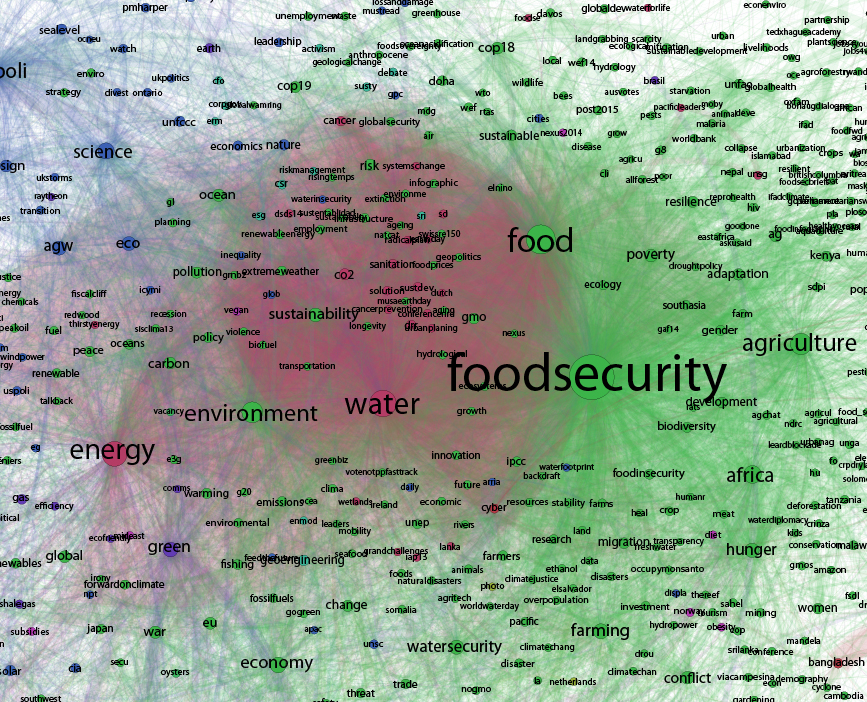
Clusters
1. Green: Foodsecurity, environment, food, sustainability, ocean, pollution, policy, gmo, nexus, hydrological, growth, ecosystems, transportation, biofuel, violence, longevity, extinction, risk, extremeweather, risingtemps, renewableenergy, ecology, poverty, droughtpolicy, adaptation, soutasia, farm, gender, development, biodiversity, foodinsecurty, africa, agchat, ndrc, agricul, food_security, agricultural, unfao, globalhealth, worldbank, malaria, resilience, livelihoods, sustainabledevelopment, scarcity, disease, forests, nutrition, humansecurity, kenya, population, greenhousegases, desertification, famine, pesticides, biotechnology, landgrabbing, happeningnow, afcconference2013, climatereport, adp2014, climatesmartagriculture, agriculture, foodcrisis, worldfoodday, humanitarian, foodwaste, cambodia, mozambique, namibia, angola, guatemala, malawi, tanzania, southernafrica, sierraleone, solomonislands, caribbean, sudan, india, pakistan, conflict, farming, watersecurity, africa, weather, 350ppm, mali, crisis, mexico, unrest, sealevelrise, rainforest, consumption, russian, england, shellfish, oysters, fishing, fossilfuels, naturaldisasters, emissions, environmental, gogreen, renewables, china, forwardonclimate, carbon, peace, climatesecurity, health, humanrights
>> Climate change related food-security, human rights and agriculture cluster
2. Pink: Tcot, teaparty, p2, tlot, gop, ccot, money, clinton, gay, pray, sochi, foreignpolicy, militia, asamom, occupwallstreet, occpuyhq, foxnews, gop2012, ukip, sexualassault, autism, ididntjoin, sandiego, vetsonsyria, muslimbrotherhood, xbox360, jihad, ocra, dems, pjnet, tgdn, impeachobama, nobama, nra, rkhn, vetso, dontrundit, noamnesty, handsofsyria, patriots, liberty, indefenseofliberty, opslam, benghazi, sequester, nosyriawar, syria
>> National and international politics
3. Red: Water, energy, co2, sanitation, solution, dutch, urbanplanning, cancerprevention, cancer, sd, dsds, systemschange, drr, conference, thirstyenergy, ecnexus, climateacti
>> Cluster of diverse issues, such as energy and cancer prevention
4. (dispersed) Blue: cdnpoli, canada, science, eco, agw, design, canada, tarsands, polsands, policymatters, idlenomore, engineering, ukstorms, transition, law, fracking, futureearth, sealevel, unfccc, economics, canadian, cpcfail, foodandwaterfirst, climatereality, aspredicted, oilsands, climatecrisis, nationalsecurity, actonclimate, sotu, reagan, taxes, snap, facts, action, scam, solarpower, solarchat, austerity, usmilitary
>> Canadian politics and climate related controversies such as tar sands, climate reality, fracking
5. (dispersed) Purple: UN, europe, psychopath, madrid, berlin, business, rome, paris, asia, brazil, maldives, marshallislands, greenenergy, world, green
>> Diverse locations
6. Yellow: Iran, usa, news, egypt, freethe7, iraq, arabspring, politics, washington, israelis, nebraska, engineer, arabnationalism, qatar, florida, nemexico, saudiarabia, egyptian, libya, arab, hamas, newyork, military_coup, boston, cairo, cougars, mumbai, denmark, oman, sacramento, palestine, london,
>> Non climate change related hashtags (floods of people, a negative climate etc.)
Findings
The co-hashtag network around the hashtag arctic reveals little attention to the connection between the arctic and military formations in the Twitter climate change space. The network does show a number of issues connected to the issue of the arctic, including a number of controversies that have also been identified in other spheres. A number of 8 clusters are identified in the network, of which especially the activism cluster that pops out, including a large frequency of the co-occurring hashtags savethearctic, freethearctic30, and the hashtag iceclimb, referring to petitions and protests concerning the Arctic initiated by the environmental organization Greenpeace. Two clusters refer to political responses towards climate change which includes the issue of the arctic, of which one is in particular focused on Canada and the controversy of the Keystone XL pipeline, reflected in the hashtags nokxl and tarsands. This pipeline is a project proposed in 2008, and gained attention in 2012 after Barack Obama rejected the application because of the feared impact on Nebraska's environmentally sensitive Sand Hills region. Other controversies concerning the Arctic identified in the network is the controversy around the drill barge Kulluk along the coast of Japan and owned by Shell, reflected in the hashtags shellfail and kulluk. An Australian focused cluster, including the hashtags auspol, ausvotes, and wapol, also reflects a controversy around the denial of the melting of the Arctic. Hashtags such as globalcooling, climatescam, alarmism, and cagw, the latter being an abbreviation for "catastrophic anthropogenic global warming" which is used as a snarl word by global warming denialists, point toward the news that an Australian scientists predicted global cooling rather than global warming. A network analysis on security related hashtags within the Climate change Twitter sphere reveals a number of climate related issues, in particular on food security and agriculture, in which mentioning of the Arctic is largely missing. It seems thus that the Arctic is not considering a pressing issue within the climate security debate on Twitter.
5. Mapping the resonance and the formatting of the Arctic as an issue in the climate change international negotiations space
In order to identify how the Arctic is being turned into an issue in the international climate change negotiations space and to particularly trace the military issue formation, we looked at the Side Events of the COPs at the recommendation of our issue expert. The Side Events of the COPs are events convened by civil society organisations during the COPs to discuss issues that do not make it into the negotiations. We collected the documentation for COPs 6 to 19 through the Earth Negotiations Bulletin, a reporting service for environment and sustainable development negotiations. From a total of over 150 documents, only 9 mentioned the Arctic and none of the mentions was in relation to the issue of military deployment in the Arctic. The mentions refer to climate changes (ice thinning, sea level rise, etc.) and the vulnerability of animal species and people (indigenous populations). We conclude that the military formations issue has not been picked up in official negotiations around climate change, whereas the increase in media coverage on this issue anticipates the scale of the issue before policy mechanisms pick it up.Concluding remarks
The examination of the resonance and formatting of the Arctic as an issue in six relevant information and policy spaces show the decline of the Arctic as an environmental issue and the rise of the melting Arctic as a military issue and as an opportunity in a number of areas such as resource extraction.Next steps
The analyses in this project are preliminary and will be redone to ensure solidity of results. Future analyses will include an examination of the action formats of the Arctic issue in different spaces following this action formats matrix: http://www.issuenetwork.org/misc/Action_Formats_matrix.htm.
| I | Attachment | Action |
Size | Date | Who | Comment |
|---|---|---|---|---|---|---|
| |
artic_subissue_DEF.jpg | manage | 188 K | 08 Apr 2014 - 13:12 | Main.liliana | |
| |
food_agriculture_2network.jpg | manage | 877 K | 08 Apr 2014 - 13:23 | Main.liliana | |
| |
industries_arctic_lexisnexis.jpg | manage | 173 K | 08 Apr 2014 - 12:42 | Main.liliana | |
| |
lexis-nexis-subjects_DEF.jpg | manage | 556 K | 08 Apr 2014 - 12:32 | Main.liliana | |
| |
lexis-nexis_companies_DEF.jpg | manage | 435 K | 08 Apr 2014 - 12:46 | Main.liliana | |
| |
newnetwork_twitter.jpg | manage | 211 K | 08 Apr 2014 - 13:16 | Main.liliana | |
| |
resonance-per-ministry-DEF.jpg | manage | 366 K | 08 Apr 2014 - 12:50 | Main.liliana | |
| |
resonancepercountry_DEF.jpg | manage | 345 K | 08 Apr 2014 - 12:53 | Main.liliana | |
| |
sourcecloud_thinktank_percountry_DEF.jpg | manage | 484 K | 08 Apr 2014 - 13:07 | Main.liliana |
Topic revision: 08 Apr 2014, liliana
 Copyright © by the contributing authors. All material on this collaboration platform is the property of the contributing authors.
Copyright © by the contributing authors. All material on this collaboration platform is the property of the contributing authors. Ideas, requests, problems regarding Foswiki? Send feedback

